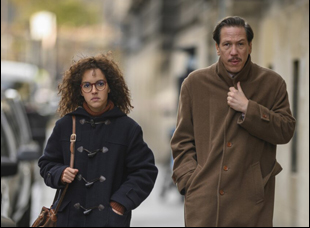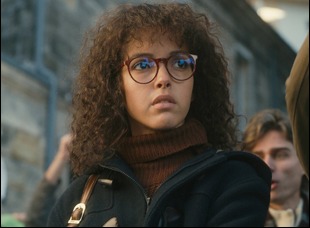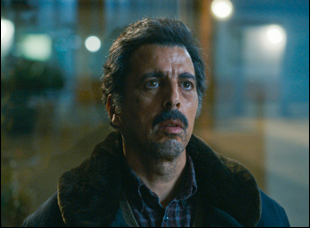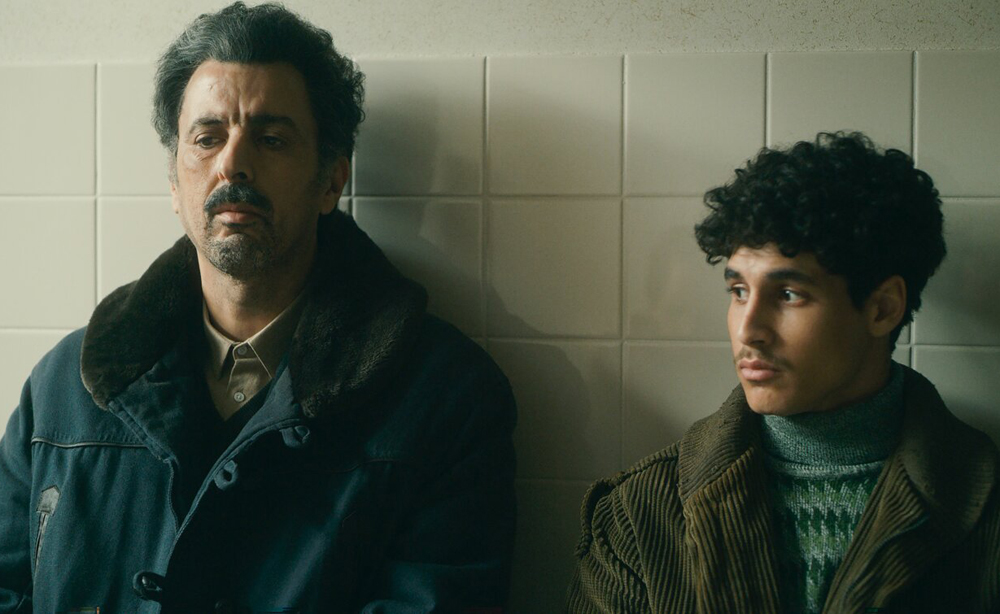No scene is all that intimidating for Rachid Bouchareb to take on these days, now five decades into an illustrious career, able to conjure chaos on the screen in his latest film “Our Brothers (Nos Fragins)” when restaging the massive student protests that flooded the streets of France in the winter of 1986 that unfolded before the lens with about as much fuss as a quiet sit-down in a cafe. However, the technical knowhow to achieve such authenticity came with an emotional cost to the director when it meant making memories of the police violence that met the demonstrations so vivid again.
“When I have 25 or more police motorcycles with the lights and sticks, I feel something inside very hard for me because I thought I was in 1986,” recalls Bouchareb, who made his first feature “Baton Rouge” around the same time as passions ran high over the Devaquet Bill, a controversial plan aimed at reducing the number of public university admissions that appeared to many as a thinly-veiled effort to discriminate against minorities. “One time, I saw them on the street and when they arrived by motorcycle and they fight the people, they gave me a lot of pain.”
The fear of those roving gangs of motorcycle cops dispatched to situations they only seem to inflame further underscores the incredibly tense feeling in the air that Bouchareb is able to recapture in “Our Brothers,” charting a precarious three days for the nation particularly for the Algerian community, which was left reeling from the murders of Malik Oussekine, a student who was savagely beaten by riot police after leaving a jazz club near a protest, and Abdel Benyahia, another young man who was killed during a police response to a disturbance at a bar, that occurred on the same evening of December 6th. Bouchareb takes the slight creative liberty of suggesting the bodies of both men passed each other at the morgue in the 6th arrondissement, with their remains in the tender care of a conscientious attendant (Wabinle Nable), but given far less regard given by the local authorities, which misidentify the bodies and delay reporting the deaths to the public for fear that it could incite more violent protests.
However, the attempt at slow walking the report is something Bouchareb knew to be more than rumor and “Our Brothers” weaves together a historical drama that gets at a greater truth as the director seamlessly blends the reality of the time and recreation, both in its telling and its very fabric when documentary footage from the era is often employed to set the scene for a coverup as equally egregious as the crimes, trailing the families of Oussekine and Benyahia as they look for answers to where their sons have disappeared to. With a special investigator (Raphael Personnaz) weighing whether to let on as much as he knows to Oussekine’s brother Mohammad (Reda Kateb) and sister Sarah (Lyna Khoudri) and Abdel’s father (Samir Guesmi) as he looks into what really happened on December 6th, both cases that his boss wants kept under wraps, the film illustrates the subtle yet extraordinary effort that goes into maintaining the structures of power from the top of governments to those in law enforcement and the brutal effect it can have on a diversifying population that it wants to rein in.
Although Bouchareb dusts off an old Betacam to confuse the issue aesthetically at times, the story that unfolds in “Our Brothers” sadly has far too many contemporary parallels and while it is a quietly devastating film, it has been generating plenty of talk since its premiere at Cannes this summer and a release in France this week. It was also recently named as Algeria’s official selection to the Oscars, which led to Bouchareb generously taking the time to have a conversation about how the film is a culmination of an ambitious plan to bring the French Algerian experience of the 20th century to the screen in a way that can’t be swept under the rug and what character in the film was inspired by his own drive to tell stories that might be ignored by the official historical record.

My project a long time ago was to make three movies – the first is “Days of Glory,” [which generationally was about] the grandfather of these young kids [in “Our Brothers”], the second is “Outside the Law,” [which is about] the father of Malik and Abdel, and [this is the story of the generation] born in Paris. In France on the 17th of October ‘68, 300 Algerian people were killed by the police and and [we had Abdel] killed by the police officers for [purportedly being] drunk in a suburb, but two hours before, Malik died inside the demonstration of the students in Paris and the government wanted to take care of how [to present this to the public], but only with Malik because with Malik, it’s the first time you have a witness and journalists arrive very fast [at the scene]. People saw what happened with the police motorcyclists and nobody said anything about it for like three days because it’s too much to say to the French people — “we killed two young from Algerian origin.” It’s too much.
Two kills like this for the people is too much because it’s the first time we have the name after the killing of Arabic or African people [in] Malik Oussekine. Before the people are invisible, we don’t have any name. Like in [the United States with] George Floyd, you have the name and maybe in America, it’s the same where [for] years before nothing happened for the people [because it was kept quiet]. With Malik, it was the first time we had a name and I knew [these murders happened at the same time] because people talk a lot about the racism and at this time, I lived in the same suburb of Paris not too far from Abdel’s family because a lot of the Algerian community that comes from Algeria lives in this area and only when you live near the family can you hear [the names].
It’s quite effective how you weave in and out of documentary footage from the time of the demonstrations against the news laws regarding education in the country. Did you have to cut that together before actually working on the narrative sections?
No, when I had the script, I had this idea because I heard a lot of very bad comments from the politicians [of the time] because President Mitterand goes to see the family, and Jacques Chirac, the minister of the interior [in charge] of the police said many things, and I didn’t want actors to play [them]. The [real] dialogue in the footage is very interesting and gives you the idea of what happened at this time, how the government can say some bad words to manage [the situation] and to try to say the [victim was] a terrorist. But it was not possible to do it with Malik because he was a student at the university and wanted to be a priest. So I prefer everybody to see how it was difficult for the politicians at this time [to paint them in this light] and to show two million French people going into the street to say, “We don’t want something like this again.” It’s interesting for the younger generation to see something happen around Malik, but nobody knows Abdel and that’s very important for people to know today. Abdel and Malik are the same case for me because they hide one to manage the second and they knew everything happened the same night.

Yes, I really like this idea because it’s another version of sentiment [when] before I work with a generation [more aligned with the history], but with Reda Kateb, he goes with his mother to the Malik demonstration when he’s young, and Lyna didn’t know [about this firsthand] because she was born after, but she discovers everything, and Samir knows the story from his family, but it’s interesting to have this generation in the movie.
The morgue attendant is an invention for the film, but a really beautiful character as an outsider. How did that idea come to mind?
A lot of movies and TV series go all the time to a morgue, and I wanted to have something different for this story when the police put Abdel [there] without a name because for three days, he doesn’t exist. I had the idea with the character from Africa because I worked a long time ago with Sotigui Kouyaté, and I wanted to work with him [but he since passed on], and I said to Wabinle [Nable], who played [this attendant] Ousmane, “Okay Wabinle, you take care of the body for three days and try to give a name to this guy when he doesn’t have name.” And he has heard everything the police said [about the case privately], but to them, he is invisible because at this time the police don’t care about immigration. He is not a danger for them. There is still this colonialist mentality, but he listens to everything and takes care of everything
And for me, like [for] “Days of Glory,” I don’t have any [firsthand] footage because at this time, the camera for the French army didn’t shoot the African soldiers. They only shot the Europeans. But I have the memory of the people [who tell their] kids and their kids have children and there is this transmission of oral [history], so [Ousmane] for me is the guy who can tell the story in the future because I imagine when the French police killed in October of ’61, many bodies went to the morgue, all without a name and when at this time, we don’t have a witness, it can be interesting that somebody like him may not exist [for the police] but he discovers everything.

Yes, but for me, the footage of politicians’ speeches are a photocopy for today. When I showed the movie in France many times this last week, all people say nothing has changed today. We thought in the ‘80s maybe we are going to [become] a new society [in terms of eliminating] the racism, but after this dream, everything continued [as if it were still] the ‘60s and when you know the whole story of France, you see 35 years when these kids are killed and today the world is the same – the discourse, the speeches, the ambiance about immigration. Today, we are in the same atmosphere.
“Our Brothers (Nos Frangins)” opens on December 12th in France. It does not yet have US distribution.




